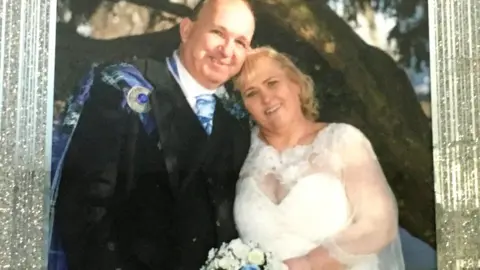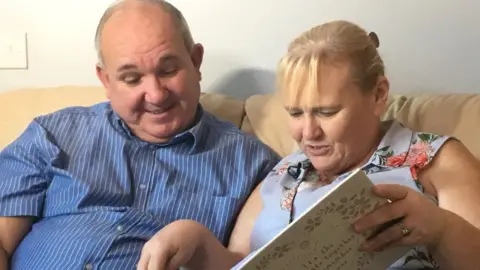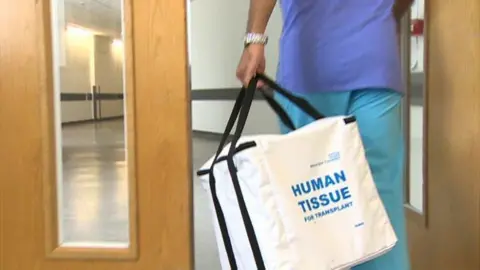Transplant patient develops cancer from donated kidney
A woman who says a kidney transplant turned into a "death sentence" after she developed cancer from the donor organ is calling for an inquiry.
Pauline Hunt, 49, from Kilmarnock in Ayrshire, thought she had been given a new lease of life last December when she received the new organ.
But she now has cancer of the lymph nodes and has been told she is too ill to undergo chemotherapy.
The Scottish government said it wanted to learn any lessons from the case.
The hospital and transplant authorities have insisted all safety protocols were followed and that the transmission of an undiagnosed cancer is a known risk.
Pauline's original kidney transplant took place at the Queen Elizabeth Hospital in Glasgow in December 2017.
 Pauline Hunt
Pauline HuntPauline thought it was a second chance.
"I woke up the next morning and I felt great. We just had this new life.
"I was fine for a few weeks and then I got this growth just above the kidney bed. They said it was fluid. But by the end of January I wasn't feeling well again."
Ten weeks after she received the donor organ, Pauline was told by a doctor that she had to have the kidney removed.
The recipient of the donor's liver - a man in Newcastle - had died after developing cancer.
After the emergency surgery, Pauline, a former carer, was diagnosed with cancer of the lymph nodes.
"It was like a death sentence," she said.
"I don't know how long I have got. I have caught cancer from a donor who should have been so healthy that this shouldn't have happened."

Pauline hopes changes are made to the system to make sure this is avoided in the future.
She said: "It shouldn't have happened. But it did, and there's nothing I can do to turn that back.
"But if highlighting this means they change something, then we are winning.
"It's not even my cancer I'm fighting now, it's someone else's cancer which makes it harder for me.
"Nobody should be fighting somebody else's cancer."
John Forsythe, the medical director for organ donation and transplantation at NHS Blood and Transplant, said: "We are aware of this tragic case and our thoughts are with the recipients and their families.
"We can confirm that an investigation found all processes were followed correctly.
"For all potential donors we carefully check their medical history and carry out new tests. If an abnormality is found during organ retrieval we will carry out a biopsy."

He said donation and transplantation had to take place quickly and usually followed an unexpected death.
"In very rare cases it is possible that the donor has a very small tumour which cannot be picked up by the tests which can be performed in the limited time available prior to transplant," he added.
"This means the transmission of an undiagnosed cancer is a known risk, although thankfully it is very rare."

Organ transplants
A total of 4,039 people had a transplant from a deceased donor in the UK last year.
The risk of transmission of a previously undiagnosed cancer from a donor to a recipient is about 1 in 2,000 organs transplanted.
Between 2001 and 2010 in the UK, 15 out of 30,765 transplant recipients developed donor‐transmitted cancers, of whom three died as a consequence.
During the same period, 4,093 patients died while waiting for transplants.

A Scottish government spokesman said it was "a very tragic case".
He said: "Despite rigorous checks and tests on donated organs carried out by specialist medical staff, given the limited time available within which donation and transplantation must take place it is unfortunately not possible to mitigate all risks that an infection could be transmitted.
"The health secretary is seeking to ensure that all appropriate investigation is carried out into the circumstances of Ms Wright's case so that any lessons that can be learned are determined, including from the review carried out by NHS Blood and Transplant."
A spokesman for NHS Greater Glasgow and Clyde said: "The process of transplantation carries known risks, including malignancy, and these are discussed at length at various stages in preparing the patient for transplantation.
"In this case, two of our senior clinicians both were content to proceed with the transplant following this rigorous process.
"Both the patient and her family were kept fully informed of this investigation and its outcome which found that the situation could not have been anticipated and the treatment and clinical decisions were appropriate and fully compliant with the strict protocols for transplantation."
